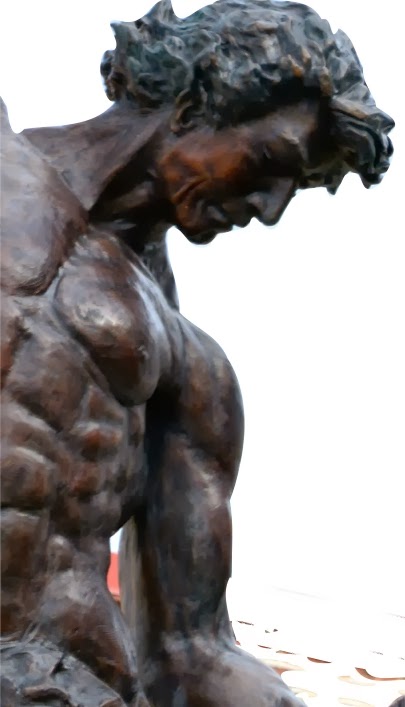Until publication loomed.
The "send" button loomed on the screen. I was ready. I was psyched. My finger hovered over the keyboard.
"Hit it," I murmured.
"Wait!" my wife said. "You know..."
Whenever she starts a sentence that way, something important is coming. I stopped and turned slowly and apprehensively to her.
"I never really liked that title," she continued. "It's too long and it just doesn't tell me anything about the story."
I would have lashed out with a stream of obscenities, except for one thing. She was right.
She makes a habit of that.
After many trials, we both agreed that The Storyteller said exactly what needed be said. With the revised cover approved, the finished project zoomed off to cyberspace. At which point, a search of Amazon revealed there were more books named The Storyteller than there were Johnsons in Minneapolis.
Which taught me "Pay as much attention to your title as you do your story."
I knew that. I once taught that. I forgot.
I'm blaming it on old age.
Of course, the title is important. After all, the title that grabs the reader's attention. It's the most memorable part of the book until the reader opens the cover. More work up front can only eliminate grief and consternation at the end of the project, not increase it.
In retrospect then, I decided to examine the titles of other works I've read, watched, and listened to. This exercise revealed ten ways titles can be constructed, tweaked, and clarified. There may be more, but these work for now.
Remember, these are only choices. Doing all of them would be daunting. I've given up daunting for the new year. Rather than dealing will all ten, I'm going to pick just one. Just which one, I don't know. See which of these works for you:
1. Alliteration–This is an oldie but a goodie. For some odd reason, alliteration sticks in the brain longer than cold oatmeal on the kitchen wall. To make your title memorable, this is at once simple and fun.
Alliteration also has the added benefit of fitting almost any genre. Jane Austen used it with her romantic novels Pride and Prejudice, as well as with Sense and Sensibility. Pastor Greg Boyd used it with his theological book Repenting of Religion.
A word of caution, though. Once you establish the alliterative mold, varying from it can bring disappointment. Having seduced potential readers with the titles Golfing with God and Breakfast with Buddha, Roland Merullo broke the pattern with Lunch with Buddha. Given the response, he probably should have had brunch first. Who knows what will happen if he tries to have Dinner with Buddha.
2. Animals–For some reason people like animals.
Cows. Dogs. Pigs. Orangutans.
Who doesn't just like saying the word orangutan?
Maybe we like animals because they make us feel we are not alone on this planet. Maybe because many are more moral than humans. Or maybe because they walk funny, and that makes us feel superior.
Be aware, though, that while readers like animals, not all animal titles work, but some of the catchiest ones do. On this frigid Minnesota night, three come to mind writing handbook Bird by Bird (Anne Lamott), novel The Curious Incident of the Dog in the Night-Time (Mark Haddon), and children's book/CD Frog Trouble (Sandra Boynton).
I have no idea what that has to do with Minnesota. Sorry.
3. "Catch" Phrases–One of the main purposes of the title is to grab your reader's attention by using an intriguing image or phrase. One of the best is Suzanne Collins's Hunger Games, which is eye-catching even if you haven't heard of the book. While you may expect a food fight or a hot dog eating contest, most people are nervously aware that games involving hunger might have a more sinister origin.
What does she do for the first sequel? Two things. First, she literally catches our attention with the word...catch. Now that my seem a bit obvious and lazy, but then she uses the television reporter's favorite device of setting that mundane word ablaze, resulting in Catching Fire. One can almost see a news person breathlessly panting into a microphone and backlit by a billowing inferno and the flashing lights of firetrucks, police cars, and over-sized SUVs looking for attention.
By the way, Collins was not the first to use the literal catch. See J.D. Salinger's Catcher in the Rye.
4. Character Names–Using a character's name in your title is fraught with danger, but the technique has proved successful if the character's name is unusual or intriguing, if the person is famous, or if there is an inherent "What?" resulting the name.
For example, the title of John Irving's novel A Prayer for Owen Meany makes one wonder if Owen has a cruel demeanor and how it will reveal itself. Shakespeare's history plays needed only a monarch's name to attract an audience, like Richard II, Henry VIII, and King John. Wendy Wasserstein threw a 20th century "fluff name" in with a term for literary epic to entice audiences to her play The Heidi Chronicles. (Who cares that she was an art historian search out her own feminist identity? The title brings to mind cheerleaders building a pyramid during the halftime of a football game.)
5. Contrast and Irony–These literary and rhetorical devices are most often used within a text to make an impact on the reader. It only makes sense to use them in titles.
The sharp contrast used in the name of Irving Stones's classic The Agony and the Ecstasy about Michelangelo almost sucks your head off your shoulders and screams,"Read me!"
Using misdirection is not only fun, but can be a tool of discovery that the reader uses to unearth interest previously unheard of. In a recent nonfiction book, Simon Garfield used a familiar phrase for his main title Just My Type, which to most sane, albeit self-absorbed, people would indicate a book on relationships. Imagine the surprise of finding the striking subtitle A Book About Fonts.
6. Events–Using events in titles only works works well if the event is included in your story. Unless the event is big enough, at which point using it in your title is a no-brainer. Stephen King recently used it in 11/22/63, commemorating the assassination of JFK. The band U2 immortalized the Irish conflict with their song "Sunday Bloody Sunday." And then there was the movie Woodstock. Only the biggest rock event EVER! In all three cases, no more needed to be said to find an audience.
7. Length–How long should your title be? There is no hard and fast rule here. Some of the most memorable titles are almost unbearably long, while others can be as effective with a single word. For example, compare Paul Zindel's play The Effect of Gamma Rays on Man-in-the-Moon Marigolds with John Patrick Shanley's Doubt.
8. Numbers–Numbers attract. I don't know why. They just do. For some reason, people like to quantify, identify, and deify with numbers. That's fine, but caution here. Numbers used to identify sequels can be an instant turnoff, whereas others attract immediate attention. The movie Once and Ray Bradbury's Fahrenheit 451 exemplify the latter.
Immediately the viewer wants to know "Once what?" The reader knows that Fahrenheit 451 is a temperature, but of what? Strangely, even when the answer is given, it's difficult to stop reading...which is the sign of a good title.
An offshoot of the previous caution is the use of dates. Historical dates work well as 1776 (David McCullough) and 1493 (Charles C. Mann) show. Future dates can cause a problem when the date comes and goes. George Orwell's 1984 is a classic, to be sure, but the story lost some of its impact the farther the world passed beyond the date depicted. The less said about the movie 2012 the better.
9. Objects–Common everyday objects make for great titles, because the more ordinary that object is, the more curious a reader will be to find out its significance. Examples: The Notebook by Nicholas Sparks, The Scarlet Letter by Nathaniel Hawthorne, and Dead Man's Cell Phone by Sarah Ruhl. You want to know what was the notebook used for, which letter was red and why, and what's up with the cell phone and how did its owner die? Questioners become seekers who ultimately become readers.
I wasn't going to mention the last one, but...
 10. Sex–Sex sells. There's no doubt about it. Okay you don't have to use sex to get attention, but I assure you it will. And this is nothing new. The concept goes way back. Look at The Rape of Lucrece by Shakespeare. And you don't even need to be that brazen. You can hint at it as William S. Burroughs did with The Naked Lunch.
10. Sex–Sex sells. There's no doubt about it. Okay you don't have to use sex to get attention, but I assure you it will. And this is nothing new. The concept goes way back. Look at The Rape of Lucrece by Shakespeare. And you don't even need to be that brazen. You can hint at it as William S. Burroughs did with The Naked Lunch. Oh, there are so many others, but somebody will call me a dirty old man, and I already have enough image issues.
Which brings us to the crux of the issue: How many books does the title sell?
I have no idea. But the more attractive the title, the more apt readers are to investigate the book. The more they investigate, the more apt they are to buy, read, and recommend it to friends and colleagues. Word of mouth will spread, and that word of mouth is invaluable. And it all starts with the right "tight" title.
Oh, and you may want to check how many others have used the same title already.
For these and other examples of strong titles, as well as a weak title list, see the "Titles, Titles, Titles" page.











